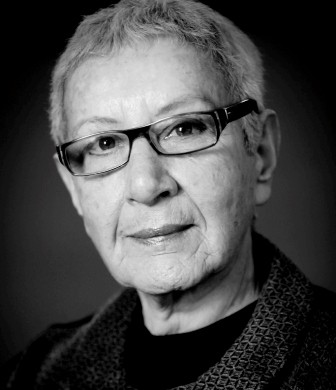The psychiatrist and activist will speak at Puget Sound:
Thursday, Sept. 22, 7:30 p.m.
TACOMA, Wash. – For a psychiatrist and human rights activist Ruchama Marton, a doctor’s role encompasses far more than curing disease and healing injuries.
“Our mission is to fight the evil that people do to other human beings, no less than fighting against viruses and microbes,” she says.
The founder of Physicians for Human Rights–Israel and recipient of the 2010 Right to Livelihood Award (“Alternative Nobel Prize”) has been calling on doctors in Israel and Palestine for almost 30 years to help bring justice, liberty, and health to people who have been marginalized, including those in the occupied territories, immigrant workers, prisoners, Bedouins, the Jewish poor, people of color, and asylum seekers.
Marton will deliver the free Swope Lecture “Forced Existence” on Thursday, Sept. 22, beginning at 7:30 p.m., in Schneebeck Concert Hall on campus. Her talk and the subsequent Q&A with the audience are complementary, but tickets are required. Please see below for how to reserve tickets and for a map of campus.
“Forced Existence” will introduce local audiences to the organization Marton presides over, Physicians for Human Rights (PHR–I), and address some of the psychological and political aspects the veteran psychiatrist observes in Israel’s Jewish society today.
Marton, a doctor, scholar, writer, and activist, has variously campaigned for human rights, women’s rights, health rights, and peace in Israel. She has received numerous awards and has been invited several times to the United Nations to discuss the Israeli-Palestinian conflict.
She was one of “40 Women That Bring About Change,” selected by the daily Israeli paper The Marker. She was chosen as one of the 1000 Women for the Nobel Peace Prize—women jointly nominated for the international peace prize in 2005. She received the Jonathan Mann Award for Global Health and Human Rights in 2002, among other honors.
Her talk will focus on PHR-I’s activities seeking prisoners’ rights, on ethical treatment of hunger strikers, and on the struggle against what Marton describes as “state-sanctioned torture and the involvement of Israeli doctors.” She also will speak about the group’s efforts to change Israeli policy toward undocumented people under its regime. In her words, she will address:
· The psychological dynamics of the Jewish-Israeli collective, including my personal attitude as a Jewish person vis-à-vis being an Israeli
· Some defense mechanisms and basic assumptions that are involved in the collective Jewish-Israeli psyche
· A “somewhat subversive” psycho-theoretical notion, which is not commonly accepted in the mental health community: the political dimension of the individual psyche
· My theoretical understanding of the term “respect” in a psychological and political context.
At the conclusion, she will discuss the term “forced existence” and its meaning for both the individual and the public.
Born in Jerusalem in 1937, prior to establishing the state of Israel, Marton served in the Sinai War in 1956 and then studied medicine at The Hebrew University of Jerusalem. She took work as a senior psychiatrist at a hospital and, from 1975 to 1990, taught at Tel Aviv University, where she tried to make humanities courses an essential part of medicine. In later years she served as a research fellow at Harvard University and a visiting scholar at The University of Chicago.
Throughout her lifetime, Marton founded or participated in numerous human rights organizations. She took a broad view of the right to health—adopting the World Health Organization’s definition of health—which covers physical, mental, and social well-being—and expanding to include the right to water, sanitation, education, electricity, sewage, work, and free mobility.
In her speech accepting The Right Livelihood Award at the Swedish Parliament in 2010, Marton called for more doctors to join the PHR-I fight for human rights, saying:
“Because health is used by the [Israeli] regime as a means of controlling its citizens, of undocumented people and Palestinians under occupation, it is through the right to health that we can best struggle against such control. … Silence is the language of complicity, but speaking out is the language of change.”
The Jane Hammer Swope Lectureship on Ethics, Religion, Faith, and Values aims to promote discussion, critical thinking, and ethical inquiry about religious matters, including its role in public life and contemporary ethics. The lectureship was established at Puget Sound through a gift from Maj. Ianthe Swope in honor of her mother, Jane Hammer Swope.
FOR TICKETS: Admission is free, but tickets are required. Tickets are available online at tickets.pugetsound.edu or Wheelock Information Center, 253.879.3100. Early reservations are recommended.
For directions and a map of the campus: pugetsound.edu/directions
For accessibility information, please contact accessibility@pugetsound.edu or 253.879.3236, or visit pugetsound.edu/accessibility.
Press photos of Ruchama Marton can be downloaded from pugetsound.edu/pressphotos.
Photos on page: From top right: Ruchama Marton; Doctors from PHR-I visit asylum seekers in the Negev, Israel (Courtesy of Activestills); A PHR-I mobile health clinic visits a West Bank village (courtesy of PHR-I)
Tweet this: Ruchaman Marton @P4HR speaks @univpugetsound on Forced Existence #humanrights #healthcare http://bit.ly/2bq5TFN
Follow us on Twitter! twitter.com/univpugetsound


